Edward Seymour
Jump to navigation
Jump to search
Edward Seymour, Lord Beauchamp, Earl of Hertford as played by Max Brown
UNFORGETTABLE CHARACTER QUOTES
DEFINING EPISODES | MEMORABLE SCENES
PHOTOS
later 1st Duke of Somerset & Lord Protector
| | ||||||||
| born c. 1506 - executed January 22, 1552 by order of Edward VI's privy council Character's backstory: Studied at Cambridge University & became a Protege of Cardinal Thomas Wolsey. With some genuine military talent, he was knighted in 1522 while still in his teens & saw military service in France in 1523. On his return he worked for Henry Fitzroy, Duke of Richmond, as Master of the Horse. He reached the court rank of esquire of the body in 1530 & had accompanied Henry & Anne to Calais in 1532. Edward benefited enormously from the fall of Anne Boleyn and the rise of his sister, Jane Seymour, to the side of King Henry VIII. A very ambitious man, Edward reached the height of his power at the death of Henry VIII, when his young nephew, Prince Edward Tudor, became King Edward VI of England. Since his nephew was too young to rule, Edward was named Lord Protector, virtually serving as the King of England. However, several factions worked to bring his power down, among them his brother, Thomas Seymour. After -popularly bringing about his brother's execution for treason, Seymour's own downfall was swift. The faction led by John Dudley arrested Seymour on charges of treason, and he died a death similar to that of his brother. Gentility: Position: Viscount Beauchamp, Earl of Hertford, Lord High Admiral, Lord High Treasurer, Earl Marshal, 1st Duke of Somerset, Lord Protector of England Personality type: Very straight-lace, cold, sturdy, no-nonsense and extremely ambitious. Humourless but he had true concerns for the needs of the English people. Occasionally he showed touches of genuine sensitivity ( unlike the series shows) and when Henry died he sent a messenger to inform the King`s `dear sister` Anne of Cleves before it was announced publicly. *the series shows him callously telling his sister Jane of their father`s death which is not based in fact. Signature look: Dour Endearing trait(s): Could get business done Annoying trait(s): Too ambitious, had his brother beheaded
| " Fear of the Lord is the beginning of wisdom. Put thy trust in the Lord with all thine heart. Be not wise in thine own conceit, but fear the Lord and flee from evil." ~ Edward Seymour
Click EasyEdit to update this page! (Don't see the EasyEdit button above? <a href="/#signin" target="_self">Sign in</a> or <a href="/accountnew" target="_self">Sign up</a>.) | |||||||
CHARACTER CONNECTIONSFamily members: John Seymour: Father Jane Seymour: Sister Thomas Seymour: Brother Prince Edward Tudor/King Edward VI: Nephew Anne Stanhope: Wife Marriage(s): 1st wife : Catherine Filiol - married c. 1527 and annulled v. 1537 after the scandal of his father having an affair with her & her children declared illegitimate 2nd Wife: Anne Stanhope -married c. 1537 - 9 children (described as being a "violent woman", and was held responsible for the fate of her husband, through having urged him to adopt a ruinous policy. She was disliked throughout the royal court) Enemies: Henry Howard, Earl of Surrey John Dudley, Duke of Northumberland Henry Grey, Marquess of Dorset | Children: Edward Seymour (1537- 1539) Edward Seymour (1539 -1621) Earl of Hertford Anne Seymour(1540- 1588). Jane Seymour (1541- 1561) Mary Seymour (born 1552) Elizabeth Seymour (1552- 3 June 1602), Lord Henry Seymour (born 1552) 2 more - one possibly Margaret Seymour
|
UNFORGETTABLE CHARACTER QUOTES
|
DEFINING EPISODES | MEMORABLE SCENES
|
<embed flashvars="transition=Fade&site=http://www.thetudorswiki.com&imageServer=http://image.wikifoundry.com&albumId=89059" height="400" src="http://widget.wetpaintserv.us/wiki/thetudorswiki/widget/unknown/7e737ba4efb980ca652000050e5af2b75b4a50e9" type="application/x-shockwave-flash" width="400" wmode="transparent"/> |
PHOTOS
 Season 4 | <a class="external" href="http://upload.wikimedia.org/wikipedia/commons/9/9c/Edward_Seymour_Duke_of_Somerset.jpg" rel="nofollow" target="_blank">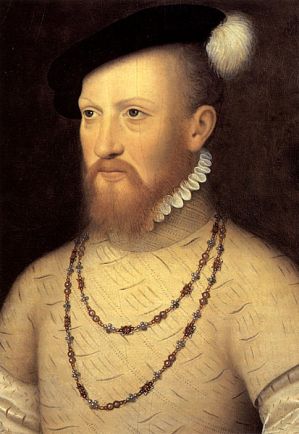 </a> </a>Portrait of Edward Seymour, Earl of Hertford and 1st Duke of Somerset, located at Weston Park, Trustees of the Weston Park Foundation |
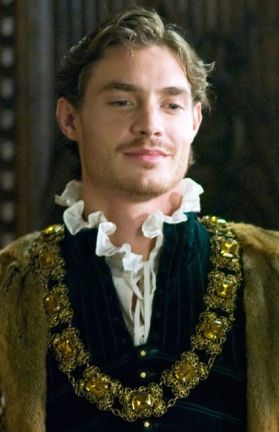 Season 3 | 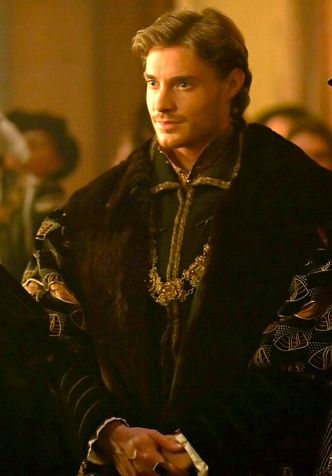 |
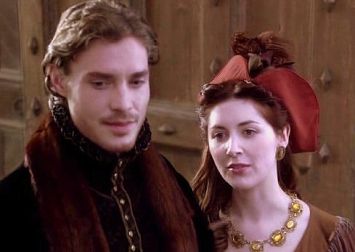 Edward & his wife Anne Stanhope | 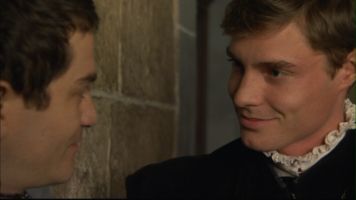 Season 2 with Thomas Cromwell |

